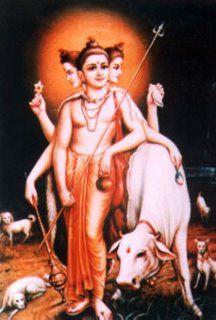-
Avadhut Gita Chapter 1
-
Avadhut Gita Chapter 2
-
Avadhut Gita Chapter 3
-
Avadhut Gita Chapter 4
-
Avadhut Gita Chapter 5
-
Avadhut Gita Chapter 6
-
Avadhut Gita Chapter 7
|
Avadhut Gita Chapter 2
The Avadhut said: 1. Hold not the immature, the
credulous, the foolish, the slow, the layman and the fallen to have
nothing good in them. They all teach something. Learn from them. Surely
we do not give up a game although we have mastered it?
2. Think not lightly of thy Guru should he lack letters and learning.
Take the Truth he teaches and ignore the rest. Know well that a boat,
painted and adorned, will carry you across the river; so also will one
that is plain and simple.
3. The higher intelligence which without effort pervades the movable
and the immovable, and which by nature is all peace and consciousness,
that am I.
4. How can the one supreme consciousness which without effort rules
the living and the inert and is all-pervasive, be other than I?
5. I am more subtle than primordial substance, beyond elements and
compounds, free from birth and death, above duality and unity.
6. The modifications of the inner organ (antahkarana) have no part in
me. Like bubbles rising and falling in a river, thoughts and volitions
rise and disappear in the inner organ.
7. As softness is not perceived apart from soft objects, as sweetness
is not known apart from honey, as bitterness is not known apart from the
Nim tree [tropical Indian tree whose leaves have an extremely bitter
taste], as fluidity and coolness are the nature of water, so the
primordial form of matter called mahat [Cosmic Mind] is no other than
the Self (Atman). As the rays of the sun differ not from the sun, so
matter does not differ from God.
8. How can "I" or "thou" be said of Brahman which is more subtle than
mahat, free from all attributes, greater than all, above the range of
mind and emotion, without medium or limitation, lord of the universe? It
can neither be called static or dynamic.
9. As space cannot be compared with another space, so Brahman being
above duality, cannot be compared with any object. Brahman alone is
perfection, taintless, all knowledge. 10. It walks not on the earth,
the wind cannot move It, the water cannot cover It, It stands in the
midst of Light.
11. It pervades space-time. Nothing pervades It. From limitations
ever free, eternally the same, with nothing outside It and nothing
within, It abides.
12. Atman, of which the high Yogis speak, most subtle, beyond
perception, without attributes, must be realized step by step, and not
by sudden violence.
13. Ever practicing Yoga [practice of mind control, detachment and
meditation], not depending on any object, the Yogi merges his
consciousness in Brahman, and becomes Brahman.
14. There is but one antidote to the poison of passions, which beget
infatuation and are highly dangerous, and that is to return to the state
of Atman. Atman is unapproachable by the emotions, is ever formless and
independent.
15. Hidden in the realm of eternal consciousness lies the world's
cause, which is prakriti. Within this cause is Brahman. The husk of a
coconut is the world, the pulp is prakriti, and the sweet cool water
encased in the pulp is Brahman.
16. Like the full moon is Atman. See It in all. Duality is the
product of defective vision. As there is only one moon so there is only
one Atman in all.
17. No duality can touch the conception of Brahman, because It is
all-pervasive. The wise who teach this acquire boundless patience, and
their disciples can never be too thankful to them.
18. The talented as well as the witless attain the state of
desirelessness by knowing the mystery of Atman, through the grace of
their spiritual teacher.
19. This transcendent state of consciousness (Nirvana) is reached by
those who are free from attachment and aversion, ever engaged in doing
good to all living beings, whose knowledge is firmly rooted, and who are
patient.
20. The Yogi is merged in the divine after leaving the body, as the
jar-space is merged in cosmic space on the destruction of the jar.
21. The statement that the future condition is determined by the
state of the thoughts at death is made of the uninitiated, not the
initiated.
22. The knower of Brahman may leave his body in a holy place, or in
the house of an untouchable, he is absorbed into Brahman.
23. When a Yogi has realized Atman, which is his true Self, birthless
and beyond the range of the mind and emotions, then the karmas [actions
and their consequences] no longer touch him. He may perform the rituals
or leave them. To him it is all one.
24. Atman realized is the master of creation, eternal,
indestructible, formless, without dimensions, absolutely independent,
without pleasure or pain, full of all powers.
25. The wise discover that Atman is not seen either by the study of
the Vedas, by initiations, by shaving the head, or by being a Guru or
chela (an approved disciple). Nor is it seen through postures.
26. That God, Atman, by whose power the whole universe is born, in
which it abides and to which it finally returns like bubbles and waves
in the sea, is realized by the wise.
27. Atman, which the wise realize, is not the aim of control of
breath (pranayama) nor of the postures of Hatha Yoga [physical
austerities and exercises]. In It there is neither knowledge nor
ignorance.
28. There is neither unity nor duality in Atman, nor unity-duality,
neither smallness nor greatness, neither emptiness nor fullness. All
these exist in the mind, and the mind is not Atman.
29. The teacher cannot teach Atman; the disciple cannot learn it.
|

|
